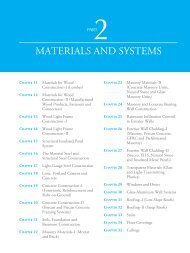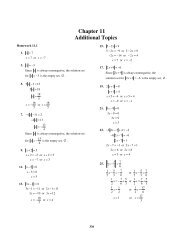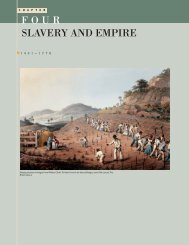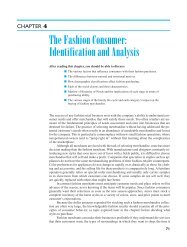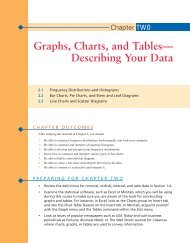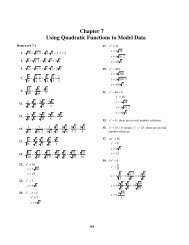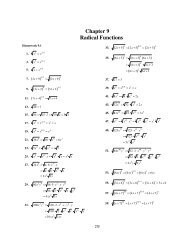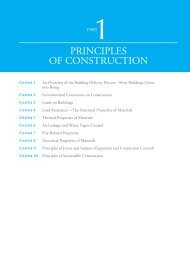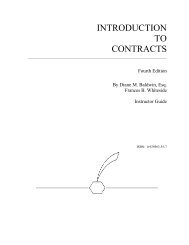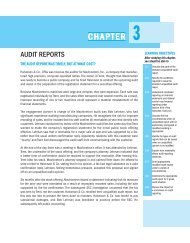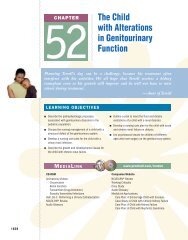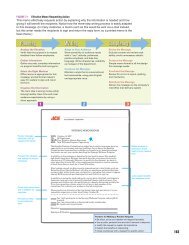audit reports
audit reports
audit reports
You also want an ePaper? Increase the reach of your titles
YUMPU automatically turns print PDFs into web optimized ePapers that Google loves.
1. Transactions are illegal or fraudulent.<br />
2. An item may materially affect some future period, even though it is immaterial<br />
when only the current period is considered.<br />
3. An item has a “psychic” effect (for example, the item changes a small loss to a<br />
small profit, maintains a trend of increasing earnings, or allows earnings to<br />
exceed analysts’ expectations).<br />
4. An item may be important in terms of possible consequences arising from<br />
contractual obligations (for example, the effect of failure to comply with a debt<br />
restriction may result in a material loan being called).<br />
Materiality Decisions—Scope Limitations Condition When there is a scope limitation in<br />
an <strong>audit</strong>, the <strong>audit</strong> report will be unqualified, qualified scope and opinion, or disclaimer,<br />
depending on the materiality of the scope limitation. The <strong>audit</strong>or will consider<br />
the same three factors included in the previous discussion about materiality decisions<br />
for failure to follow GAAP, but they will be considered differently. The size of potential<br />
misstatements, rather than known misstatements, is important in determining<br />
whether an unqualified report, a qualified report, or a disclaimer of opinion is appropriate<br />
for a scope limitation. For example, if recorded accounts payable of $400,000<br />
was not <strong>audit</strong>ed, the <strong>audit</strong>or must evaluate the potential misstatement in accounts<br />
payable and decide how materially the financial statements could be affected. The pervasiveness<br />
of these potential misstatements must also be considered.<br />
It is typically more difficult to evaluate the materiality of potential misstatements<br />
resulting from a scope limitation than for failure to follow GAAP. Misstatements<br />
resulting from failure to follow GAAP are known. Those resulting from scope limita -<br />
tions must usually be subjectively measured in terms of potential or likely misstate -<br />
ments. For example, a recorded accounts payable of $400,000 might be understated by<br />
more than $1 million, which may affect several totals, including gross margin, net<br />
earnings, and total assets.<br />
DISCUSSION OF CONDITIONS REQUIRING A DEPARTURE<br />
You should now understand the relationships among the conditions requiring a departure<br />
from an unqualified report, the major types of <strong>reports</strong> other than unqualified, and<br />
the three levels of materiality. This part of the chapter examines the conditions requiring<br />
a departure from an unqualified report in greater detail and shows examples of<br />
<strong>reports</strong>.<br />
OBJECTIVE 3-7<br />
Draft appropriately modified<br />
<strong>audit</strong> <strong>reports</strong> under a variety of<br />
circumstances.<br />
Two major categories of scope restrictions exist: those caused by a client and those<br />
caused by conditions beyond the control of either the client or the <strong>audit</strong>or. The effect<br />
on the <strong>audit</strong>or’s report is the same for either, but the interpretation of materiality is<br />
likely to be different. When there is a scope restriction, the appropriate response is to<br />
issue an unqualified report, a qualification of scope and opinion, or a disclaimer of<br />
opinion, depending on materiality.<br />
For client-imposed restrictions, the <strong>audit</strong>or should be concerned about the possibility<br />
that management is trying to prevent discovery of misstated information. In such<br />
cases, <strong>audit</strong>ing standards encourage a disclaimer of opinion when materiality is in<br />
question. When restrictions result from conditions beyond the client’s control, a qualification<br />
of scope and opinion is more likely.<br />
Two restrictions occasionally imposed by clients on the <strong>audit</strong>or’s scope relate to the<br />
observation of physical inventory and the confirmation of accounts receivable, but<br />
other restrictions may also occur. Reasons for client-imposed scope restrictions may be<br />
a desire to save <strong>audit</strong> fees and, in the case of confirming receivables, to prevent possible<br />
conflicts between the client and customer when amounts differ.<br />
Auditor’s Scope Has<br />
Been Restricted<br />
CHAPTER 3 / AUDIT REPORTS 59



